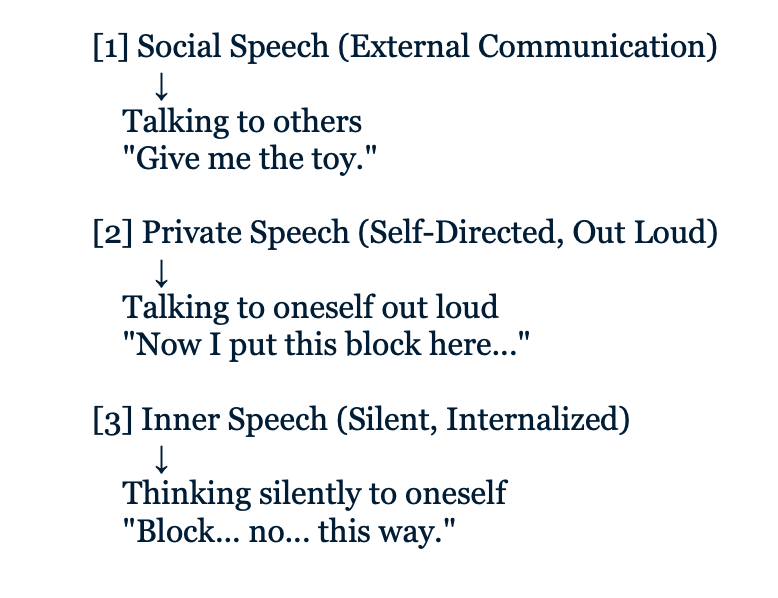For most of my life, I assumed the answer to that was obviously yes. Growing up as an only child — before my younger brother was born — I often played alone, and my inner voice became my companion. I talked to myself, reflected, and reasoned through things with that voice in my head. It made me feel not alone.
But recently, I discovered something that completely shook me: not everyone has an inner voice.
Yes, apparently around 30–50% of people don’t experience an internal monologue. Some studies even suggest higher. At first, I thought this was impossible. Since then, I’ve been asking everyone I know, and I still haven’t found anyone who claims to lack one. So… are these people out there? And if they are — what does that mean about how they think?
Definition Of Inner Speech
Inner speech – also called verbal thought, or simply that “ little voice inside your head”
Types Of Inner Speech
Turns out, that little voice doesn’t always show up the same way. Some people talk to themselves in full sentences, others just get flashes of words or even feelings.
1. Expanded Inner Speech
What it is: Full, clear sentences — like talking to yourself in your head.
Example: “Okay, first I need to send that email, then pick up groceries.”
When it happens: Planning, reasoning, or mentally rehearsing conversations.
2. Condensed Inner Speech
What it is: Shortened, vague fragments or even just keywords or impressions.
Example: “Email… groceries… later.”
When it happens: When you’re in a rush or already know what you mean — like shorthand to yourself.
3. Dialogic Inner Speech
What it is: Inner conversations, often involving imagined others or opposing viewpoints.
Example: “Should I go to the party?” — “Maybe, but you’ll be tired.”
When it happens: Decision-making, self-reflection, or preparing for social interaction.
4. Evaluative or Critical Voice
What it is: The inner critic or coach — often emotionally toned.
Example: “That was stupid,” or “You’ve got this.”
When it happens: During performance, stress, or self-evaluation.
It's important to remember: this isn't something that is set in stone, you can have so many different types of inner voices.
Some individuals might default to one form more than others , but inner speech is typically flexible and contextbased. It shifts depending on what you’re doing and thinking about.
If I think about what my default setting could be, my mind almost explodes. I am torn between the expanded inner speech and Dialogue, at least I feel like I use those the most often. But that doesn't stop me from activating the other types.
Learning to Think Out Loud
Inner voice has always played a huge role in my life. As I said I didn’t have siblings around when I was young — my older brothers had already left home, and my younger brother wasn’t born yet.
So I had to learn to play and think on my own. That voice in my head became a kind of companion. I’d talk to myself, reason through things, and even have full-on conversations with imaginary people. And it didn’t feel strange — it felt natural.
It was my normal.
Looking back, I now realise how much that inner speech actually helped me. It made me feel connected and creative. It wasn’t just noise in my mind. It helped me solve problems, rehearse conversations, and make decisions. Most importantly, it was my friend – someone who I could always lean on.
I’ve also noticed this pattern in others — especially my younger brother. He just turned 6 and he is in a phase of talking out loud to himself, narrating what he is doing or thinking.
According to developmental psychology, that’s a typical pathway – something that fascinated a Russian psychologist named Lev Vygotsky.
Vygotsky’s Theory
Vyotsky was a Russian psychologist in the early 20th century.
He proposed that when we’re young, our first use of language is entirely outward. We talk to others to express needs, ask questions, and connect.
As we grow older, we begin speaking to ourselves out loud — something you’ve probably seen children do when they’re playing alone or trying to figure something out. ( my brother)
That stage, known as private speech, is often full of whispers or half-sentences that make sense only to the child. And over time, as the brain matures, that private speech moves inward and becomes silent.
That’s when it transforms into what we call inner speech — a voice in the mind, a private dialogue meant only for ourselves.
This theory should also explain why inner speech is typically more condensed and less structured than spoken language. it’s designed for the self, not for others.
Functions Of Inner Speech
It’s easy to think of inner speech as just background noise, or maybe even a distraction. But in reality, it has a much bigger part to play. That little voice inside our head is often behind the scenes, going unnoticed, helping us throughout the day.
I don't know about you, but I use it constantly. When I’m trying to remember something, make a plan, or figure out what to do next, I’m usually talking to myself in my head. Like, “Okay, finish this first, then move on,” or “Wait, did I lock the door?”
It’s also how I keep myself focused and on track, especially when everything around me is a bit chaotic. That inner voice helps with memory, organizing my thoughts, and making decisions – almost like my brains little assistant
But like with every good thing, it has its dark side…
Instead of being encouraging, it sometimes becomes that critical moron — the one that points out everything you did wrong.
And sometimes that voice can get a little too loud, and it can mess with your head. You start overthinking, going in circles, trying not to feel anxious.
What’s even more wild is that in some extreme cases, the brain can actually lose track of its own inner voice. So it doesn’t realize it’s you talking to yourself. That’s when people can experience things like hearing voices that feel like they’re coming from outside. Some researchers think this might be linked to mental health conditions like schizophrenia — where your own thoughts start feeling like they belong to someone else (AVH)
People Without The Inner Voice
Google says that about 30-50 % of people don't have an inner voice. But yet I have never met a person like this. Since I discovered this I have been asking everybody and still no.But rather than thinking what's missing, perhaps we should be asking, what's different?
Some people are visual thinkers. Instead of narrating their thoughts, they literally “see” them.
When asked to plan a vacation, they might visualize scenes of the airport, the hotel, and their suitcase — like a movie playing in the mind’s eye — rather than verbally listing steps like, “Book flights, pack clothes, go to the airport.”
Others describe their thoughts as abstract or sensory-based. They might not use language at all but instead process ideas through feelings, spatial awareness, or gut-level impressions.
A graphic designer may simply “feel” when a layout looks balanced. A dancer may sense a rhythm or pattern before ever naming it.
One moment that really stuck with me was from a YouTube Q&A with a girl who doesn’t have an inner voice. Someone asked her how she experiences anxiety. Her answer honestly surprised me — and unsettled me a bit. She said she doesn’t even realize she’s anxious until her body starts reacting. Her hands get itchy, she breaks out in a rash. That’s when she knows something’s wrong.
For me, it’s completely different. I usually feel anxiety in words first. My inner voice tells me I’m stressed before my body even catches up. It might say, “You’re overwhelmed,” or, “Something feels off,” and that verbal cue helps me understand and process it. I can name the feeling, which gives me a chance to calm myself down or think through it before it snowballs.
And then it got me wondering —asking a question perhaps one should not ask: could not having an inner voice say something about intelligence?
I don’t mean that in a negative or superior way. It’s just a genuine question. Because while I rely a lot on inner speech, I also realized: I don’t just think in words. I can picture things, clearly and in detail. I can feel when a design is balanced without explaining why. I can sense an emotion before I put it into language.
So it’s not that I only think one way.
And maybe that’s where the link to intelligence comes in.
Not in having just one way of thinking, but in being able to combine them. Maybe having inner speech on top of all those other forms, gives me an extra layer, almost like a boost to emotional awareness and intelligence.
Inner Speech Vs IQ
Ever since I discovered the concept of inner speech, I keep circling back to the same question—could the voice in our heads be tied to how smart we are?
In Estonia, we have a saying: “Enne mõtle, siis ütle”—“Think before you speak.” It’s one of the ways we tend to distinguish the wise from the foolish. Who would’ve thought I’d end up reflecting on that in this context?
Although it hasn’t been conclusively proven that inner speech is tied to intelligence, research suggests that inner speech plays a crucial role in cognitive control, particularly in executive functions like attention, planning, memory, and behavioral regulation.
Studies have found that inner speech, or talking to yourself in your head, helps with problem-solving, especially in tasks that require logical steps, planning, or working with symbols like math or puzzles.
When people are prevented from using inner speech—for example, by repeating simple words like “la la la” while completing a task—their performance usually drops. This suggests that inner speech plays an active role in organizing thought
Inner speech is closely linked to executive function, which includes abilities like focusing attention, holding information in working memory, planning, and controlling impulses. It supports decision-making, error detection, and task-switching.
Neuroimaging studies have linked inner speech to activity in the left inferior frontal gyrus (Broca’s area) and dorsolateral prefrontal cortex, regions known for language production and executive control.
This overlap suggests that inner speech may serve as a bridge between linguistic processing and cognitive control systems. People who experience more vivid or frequent inner speech also tend to have stronger connections between these brain regions when their minds are at rest.
That said, this is my theory. The prefrontal cortex, which is deeply involved in inner speech, is also the part of the brain responsible for executive functions like planning, inhibition, and complex reasoning. These are abilities we closely associate with intelligence. So, if inner speech activates and strengthens that region, it seems reasonable to think that it could boost certain kinds of cognitive performance, especially in areas involving verbal or logical reasoning.
Important Distinctions
While inner speech plays an important role in supporting mental functions, it isn’t the same as IQ or general intelligence. Many highly intelligent people don’t rely on inner verbal dialogue. Instead, they may think through images, physical sensations, or abstract patterns. At the same time, someone with a strong inner voice isn’t necessarily better at all forms of reasoning. Intelligence comes in many shapes—verbal, spatial, visual, emotional—and no single cognitive style defines it completely.
But hey — just remember, I’m not an expert. I’m not a psychologist or a neuroscientist. I’m just someone who finds this stuff really fascinating and wanted to think out loud about it (ironically, with my inner voice).
In the end, it’s not about having a voice in your head.
It’s about how you use your mind — however it speaks.









that means they never dream. I dont think its possible.
> "Growing up as an only child — before my younger brother was born — I often played alone, and my inner voice became my companion."
Being the oldest kid of four in a family, I think I had some similar experiences growing up. Your "my companion" reminds me that I apparently -- according to my mother, gawd rest her soul -- had several such "imaginary friends" who I apparently named Kip and Kak. Though can't say I remember anything about them -- sort of a case of Puff the Magic Dragon.
But kind of a fascinating phenomenon in many ways. You probably know of a book by Julian Jaynes, "The Origin of Consciousness in the Breakdown of the Bicameral Mind":
https://en.wikipedia.org/wiki/The_Origin_of_Consciousness_in_the_Breakdown_of_the_Bicameral_Mind
Can't say I've ever read it -- too many books, too little time -- but it certainly seems a plausible and intriguing hypothesis.